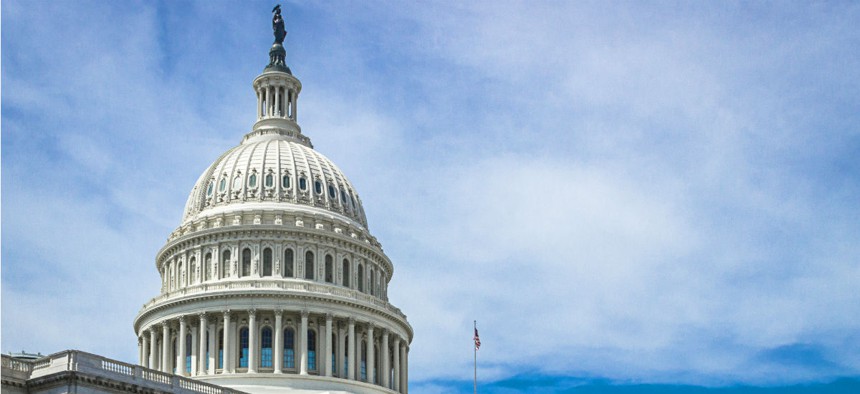House Approves Massive Federal Spending Bill, Giving Senate One Day to Avoid Shutdown
President Trump would sign the measure into law, the White House said Thursday.
The House on Thursday passed a $1.3 trillion funding package 256-167 to set spending levels at every federal agency, sending the measure to the Senate for passage before the government shuts down at midnight Friday.
The measure was just unveiled Wednesday evening after negotiations over an array of sticking points delayed its release. The bill allocates $63 billion more for domestic agencies than they would have received under previous spending caps thanks to a two-year budget deal President Trump signed into law earlier in the year. Agencies are operating under their fifth continuing resolution of fiscal 2018, which is set to expire Friday night.
The Senate will now rush to pass the 2,232-page agreement on an expedited schedule that will require a sign-off from every senator. That raises the possibility that senators will have to work into the weekend to wrap up the agreement. Conservative House members also criticized leadership for negotiating the deal in secret and forcing a vote without enough time for members to read the bill, and a couple dozen ultimately voted against it.
The White House on Thursday said President Trump would sign the measure, while noting significant concessions included in the bill. The president himself said the bill contained Democratic “giveaways” that were required in order to “take care of military pay and increase new equipment.” Trump on Wednesday briefly considered withholding his support for the bill, but Republican congressional leaders were ultimately able to assuage his concerns.
“Is it perfect? No,” Office of Management and Budget Director Mick Mulvaney said at the White House Thursday. “Is it everything we asked for? No, we were never going to get that.” He noted Republicans had to make concessions to reach the 60-vote threshold in the Senate. He suggested the president be given line-item veto authority in the future.
A lot of people voted against the measure for various reasons, Mulvaney said, but "the president wants it to pass and wants it signed.”
Leaders in both parties expressed approval of the measure.
“These critical investments were made possible by Democrats standing strong against insufficient and partisan appropriations bills throughout this budget and appropriations process, and securing $117 billion more in non-defense discretionary funding than the president requested,” said Rep. Nita Lowey, D-N.Y., the top Democrat on the House Appropriations Committee. “They will pay dividends in job creation, economic growth, and critical support for American families and communities. I am also pleased Democrats stood strong to eliminate scores of divisive poison-pill riders targeting women’s health, clean air and water, worker rights, consumer financial protections and much more.”
Rep. Rodney Frelinghuysen, R-N.J., the appropriations chairman, praised investments in defense, border security, efforts to combat the opioid crisis and infrastructure.
“These investments are made responsibly, with an eye towards getting the most out of every dollar, and reflect the priorities of the American people," Frelinghuysen said. "This legislation will bring real and lasting solutions to the many challenges facing our nation both at home and abroad.”
In addition to setting funding levels, several high-profile provisions of the bill will implement key new policies on agency operations. The Homeland Security Department, for example, would be able to hire just 65 new customs enforcement agents. Trump had requested Immigration and Customs Enforcement hire 1,000 new agents in fiscal 2018 as part of his mandate that the agency hire 10,000 additional law enforcement personnel. The measure does include $1.6 billion for physical barrier construction along the U.S.-Mexico border, but prohibits a concrete wall in favor of secondary fencing and 33 miles of new barriers.
Some agencies, such as the departments of State and Agriculture, will face restrictions in implementing their planned reorganizations, including efforts to cut staffers.
Other provisions that held up negotiations included a shoring up of the federal background check system for firearm purchases, a tunnel project between New York and New Jersey, and easing the process for the Veterans Affairs Department to close facilities and pay for veterans to access private care. The gun issue was included in the bill and the Gateway tunnel project may receive future federal funding through compromise language, but the VA reforms were excluded after Democrats objected.
Due to the overall uptick in spending, most agencies would wind up with increases compared to their fiscal 2017 funding levels under the omnibus measure. Even the Environmental Protection Agency, which has faced nearly a decade of cuts, would see $763 million more than the 2017 enacted level. The departments of Defense, Veterans Affairs and Homeland Security would see the largest funding increases.
Military personnel will receive a 2.4 percent pay raise, while members of Congress will once again see their pay frozen. Civilian federal employees have already received a 1.9 percent pay increase for 2018.
Congressional leaders expressed optimism Congress could wrap up its work without having to hold votes over the weekend, but the exact timing of final approval in the Senate remains unclear.








